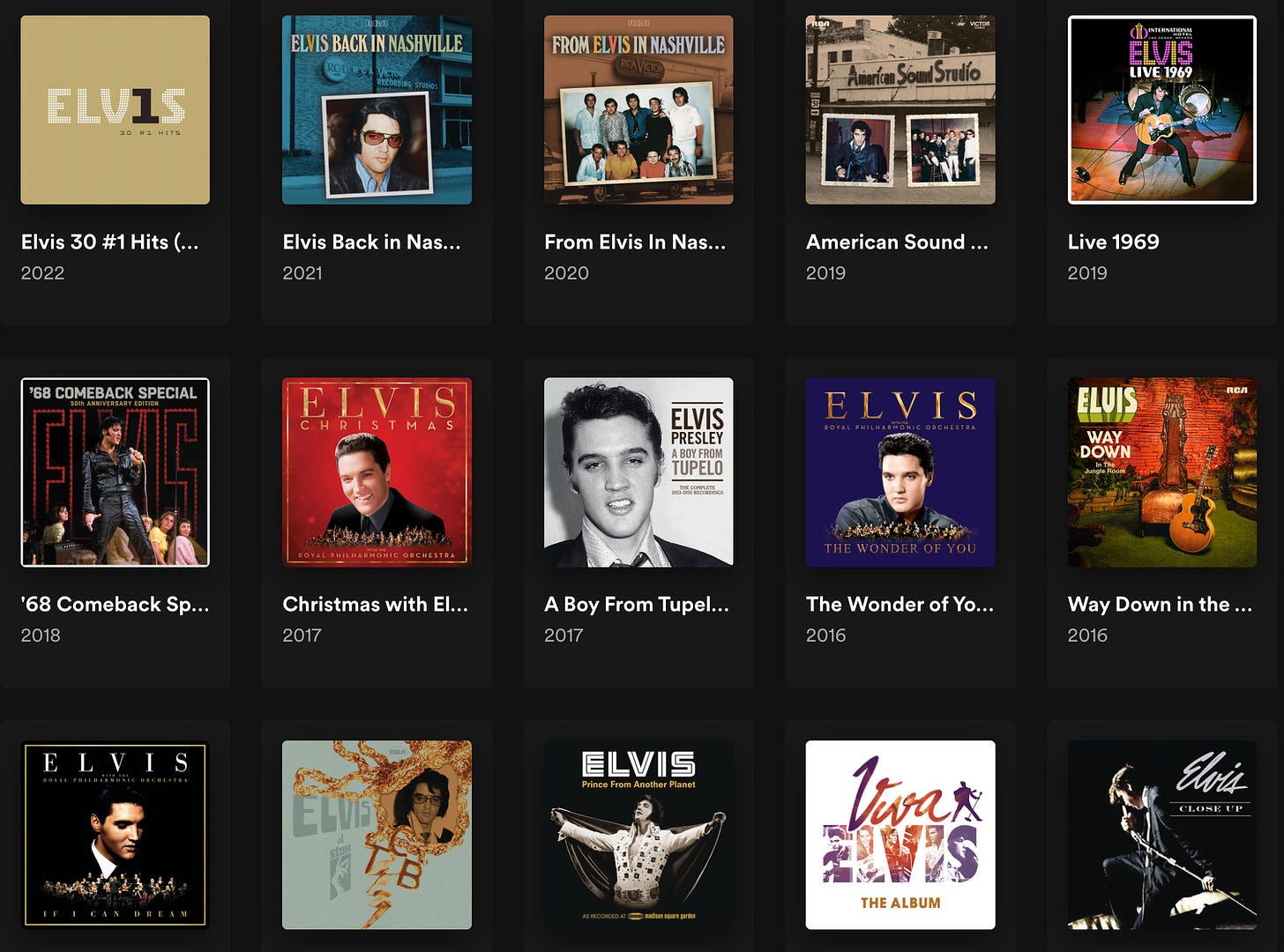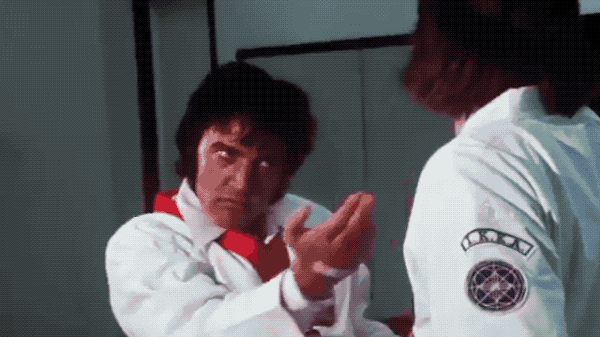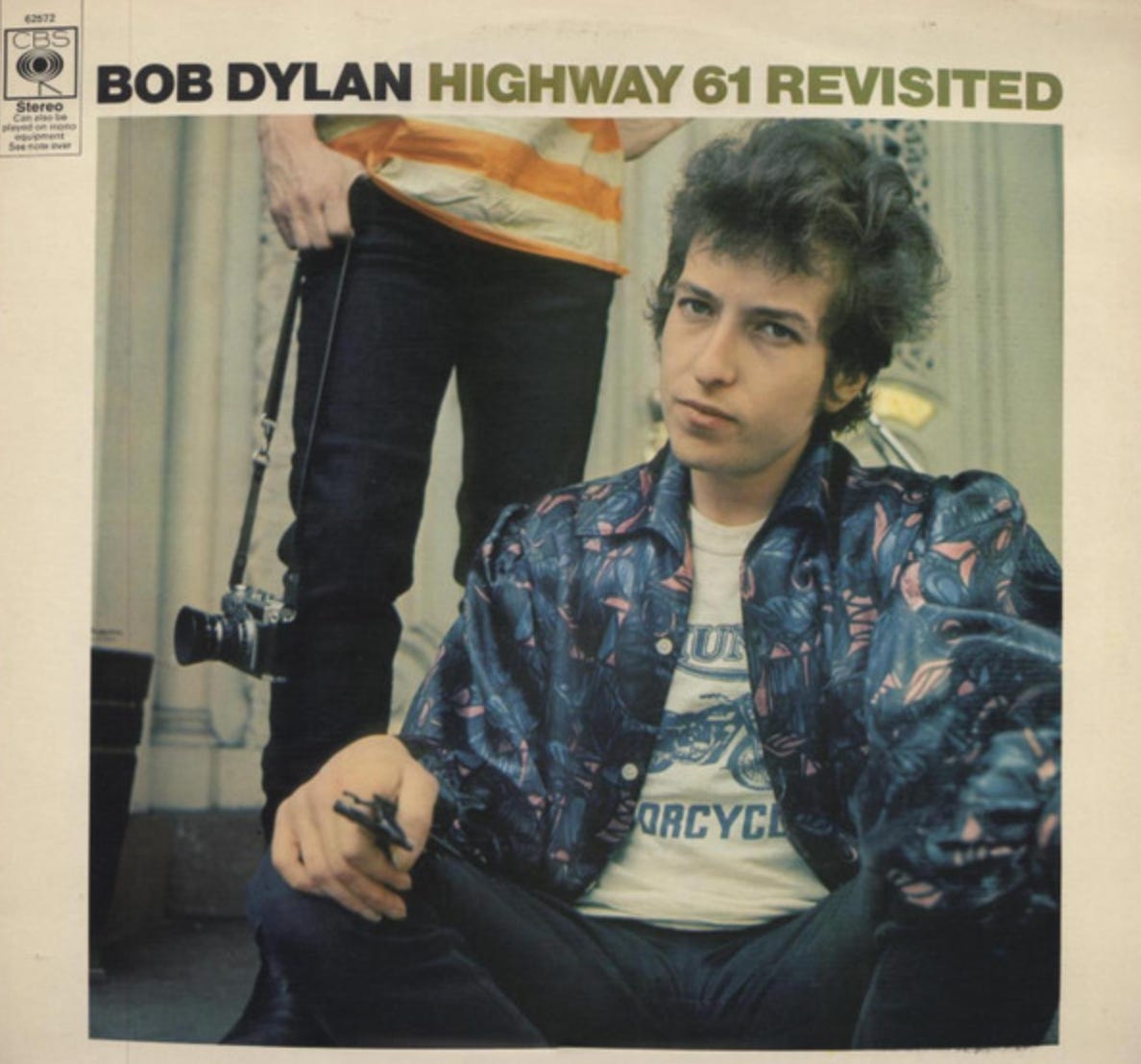Welcome to Flashlight & A Biscuit, my Saturday-morning Southern culture offshoot of my work at Yahoo Sports. If you’re just arriving for the first time, why not subscribe? It’s free and all.
Elvis has returned to the building, one last time. A new biopic, fittingly titled “Elvis,” hits theaters this weekend, and it should bring about at least a pulse of interest in the man who once was king. I wrote about E’s football-playing prowess over at Yahoo Sports this week; here, we’ll get cultural.
The fact that Elvis-the-icon still has enough juice to get a major motion picture made is impressive; the fact that his star has dimmed to candlelight in the last couple decades is a bit heartbreaking.
Elvis, as an enduring cultural institution, has a whole lot working against him in the year 2022. To start, there’s the Rule of 50. With rare exception, popularity — even global popularity — doesn’t generally last more than 50 years after the death of the artist. (Ask anyone under 35 if they know who Johnny Carson or Sam Kinison are.) Elvis died in 1977 at the age of 42; an Elvis fan that was his age at the time of his passing is now deep into their 80s.
The Boomers have a hammerlock on so much of American life, but popular culture in the last couple decades has wriggled its way out from under their everything-was-better-in-the-Summer-of-Love shadow. You can live a perfectly full, culturally aware 21st-century life and go years without brushing up against Elvis, as unbelievable as that would have seemed at the time of his death.
Plus, Elvis is the avatar of several cultural trends that aren’t exactly in favor right now. He’s a snarling alpha male who romances a revolving door of ladies, he’s a white artist who appropriated and repackaged Black music for white audiences, he’s the epitome of oily Vegas showbiz schmaltz. He’s the godfather of a musical genre — rock n’ roll — that’s little more than a surface street now, well off the main pop culture highway.
Beyond all that, the simple truth is this: after nearly 50 years gone, Elvis doesn’t have any more secrets. The curators of his musical legacy trot out at least an album a year — as you can see above, he’s released at least 12 “new” albums in the last decade — repackaging and reworking the reliable ol’ hits into new compilations. It’s all just rearranging the same old furniture. He boasts 13 million monthly listeners on Spotify, which sounds impressive until you see that he’s only ranked 348th in the world.
And yet … the King still has some moves left, if you know where to look.
Maybe you’ve got to be of a certain age to view Elvis with reverence. Maybe you have to be able to turn off the ever-present smug, ironic cynicism that we all don like Iron Man’s suit of armor every time we open our phones. Maybe you just have to be able to forget the capes-and-rhinestones Vegas era. (Do not listen to “In The Ghetto” or “American Trilogy” from this period; the cringe will cause serious, possibly permanent injury.)
When he was at his best, when he was the fierce, defiant, growling apex predator, there was no one better. He whipped country, blues, gospel and R&B into a stew, threw a backbeat onto it, and changed the course of musical — and cultural — history. (I wrote about the first time Elvis put voice to wax a couple years back.) Young Elvis — skinny Elvis, cocky Elvis, swingin’-hips Elvis — wasn’t just compelling, he was dangerous, an existential threat to the establishment sensibilities of his day.
But then Elvis got rich, and Elvis got content, and Elvis lost his edge. His songs grew flabby and saccharine, full of forced cheer tinged with middle-aged regret. During the ‘60s, he veered hard into movies — really incredibly terrible movies — and while he left the stage vacant, everyone from the Beatles to the Stones to Jimi Hendrix to Janis Joplin to Bob Dylan swooped in and claimed his throne, his mic, his aura. They rendered Elvis deeply uncool and instantly obsolete, the same way he’d banished Perry Como and Bing Crosby, the same way Nirvana would obliterate hair metal 25 years later.
So Elvis decided to get mean again.
Sometime around 1967, Colonel Tom Parker, Elvis’ manager/enabler, hit upon the idea of bringing Elvis back to the national stage through a Christmas special. This was a bit of rich irony, given that it was Parker who’d been routing Elvis through years of cheap pump-and-dump films with moronic plots and forgettable songs. Elvis heard of the idea and rejected it outright — you don’t go toe-to-toe with the Rolling Stones by singing some damn Christmas carols, for God’s sake — and instead insisted on a stripped-down live performance. He threw away a planned script — he was supposed to “banter” with his band and “casually” work in references to his Hollywood work — and just cut loose like the old days, one last time.
The result, broadcast on Dec. 3, 1968 and immediately released on vinyl, was a pop culture landmark, Elvis reclaiming the crown with such a chill, easy demeanor you wonder how he got so lost in the first place. There was, of course, plenty of garbage filler, but the most memorable sequence had Elvis and his band, eye to eye, on a tiny stage not much larger than a pool table, reminding the world that the King, for one night, was still the King.
One cut I love: E’s take on “That’s All Right, Mama,” one of his earliest hits. Literally anyone on Earth can do a version of Elvis singing — the basso drawl, the guttural “uh-huh-huh” come-ons — but to hear the King himself in full cry, in full control, is something else entirely. You can hear that song right here, leading off the Flashlight & A Biscuit Spotify playlist:
You can also watch it in that video above, which adds a whole new dimension: Elvis as confident and seductive, older, wiser, softer around the edges but every bit as magnetic.
The Comeback Special gave Presley something “he had not been able to do for years: being able to choose the people; being able to choose what songs and not being told what had to be on the soundtrack,” Jerry Schilling, one of E’s Memphis Mafia, said later. “He was out of prison, man.”
Energized by the connection with a live audience, Elvis got back to recording new material — his last great song, “Suspicious Minds,” came from the post-Comeback special sessions recorded in Memphis — and got back out on the road to tour America for the first time in well over a decade. (Elvis almost never left the country; his only international performances were in Canada. The prevailing belief behind this was that because Col. Tom was an illegal immigrant, he feared being deported if he was caught.) He was mean again. He was hungry again. He was Elvis again.
It wouldn’t last. The drag of Vegas, the weight of celebrity, the claws of addiction, the temptation of getting anything at any time … it all dragged Elvis down, down, down. He died in 1977, a pale, bloated specter of his former self.
Let’s not remember him that way.
Shameless community-building exercise: Tell me your favorite Elvis song. And if you don’t have one, time to rectify that.
Elvis will never again be any bigger than he is right now, and he’s smaller now than he was a decade ago. Like Dale Earnhardt and Arnold Palmer, his time has come and gone. His particular America doesn’t exist anymore, and he doesn’t fit into this one.
And still, he persists. Diluted by time, yes, but still here.
You can’t tell the story of 20th century America without Elvis, and you can’t tell the story of Elvis without the ‘68 Comeback Special. For just one more moment onstage, Elvis recaptured his own lost youth, reconnected with what made him who he was, renewed faith in a generation that had already started to lose hope. He dug deep within himself and, one last time, found genius. What’s not to love about that?
Take us out, King:
Have a fine week, my friends. See you back here as we prepare to destroy stuff to honor our nation’s birthday.
—Jay
This is issue #61 of Flashlight & A Biscuit. Check out all the past issues right here. Feel free to email me with your thoughts, tips and advice. If you’re new around here, check out some of our hits:
Beware the White River Monster of Arkansas!
An ode to an Atlanta landmark from the last days of disco
On the Drive-By Truckers and why you should always go to the show
A Memorial Day story of heroism and loss in the South Pacific
What is a Diablo Sandwich, anyway? Solving a “Smokey and the Bandit”mystery
A journey to the heart of the real America: Buc-ees.
Beneath the waters of the South’s most haunted lake
What does “Flashlight & A Biscuit” mean, anyway?
If you dig this newsletter, share it with your friends. Invite others to the party, everyone’s welcome.






My Mom loved Elvis, even saw him live in Berlin. Listened to (and yes sung) Elvis growing up… So don’t have a single favorite… Love Me Tender, Can’t Help Falling…, That’s All Right, Hound Dog, All Shook Up, An American Trilogy, and many more.
King Creole.